RV Safety
There’s not much that can ruin a trip out like a safety issue.
Most are simply an inconvenience but they can be serious too.
There can be safety issues with your RV, your tow vehicle, your camping equipment, camping site or your camping habits but all can be avoided. Most are simple common sense items but not everyone has ‘camping common sense’ (but that’s nothing to be ashamed of).
First is RV maintenance.
More than anything, first comes RV maintenance. If your are not mechanically experienced and knowledgeable, be sure to take your RV in to your dealer, or other maintenance/repair center, at a minimum before the start of each camping season. After setting unused for months during the winter, things tend to need maintenance. One is the grease in the wheel bearings.
Also check your owner manual to see what it says about maintenance. I might affect your warranty if you miss required maintenance. If you travel a lot, ask your maintenance facility how often you should come in. I would suggest at least every 10,000 miles of road time.
There are things you should frequently check yourself such as: 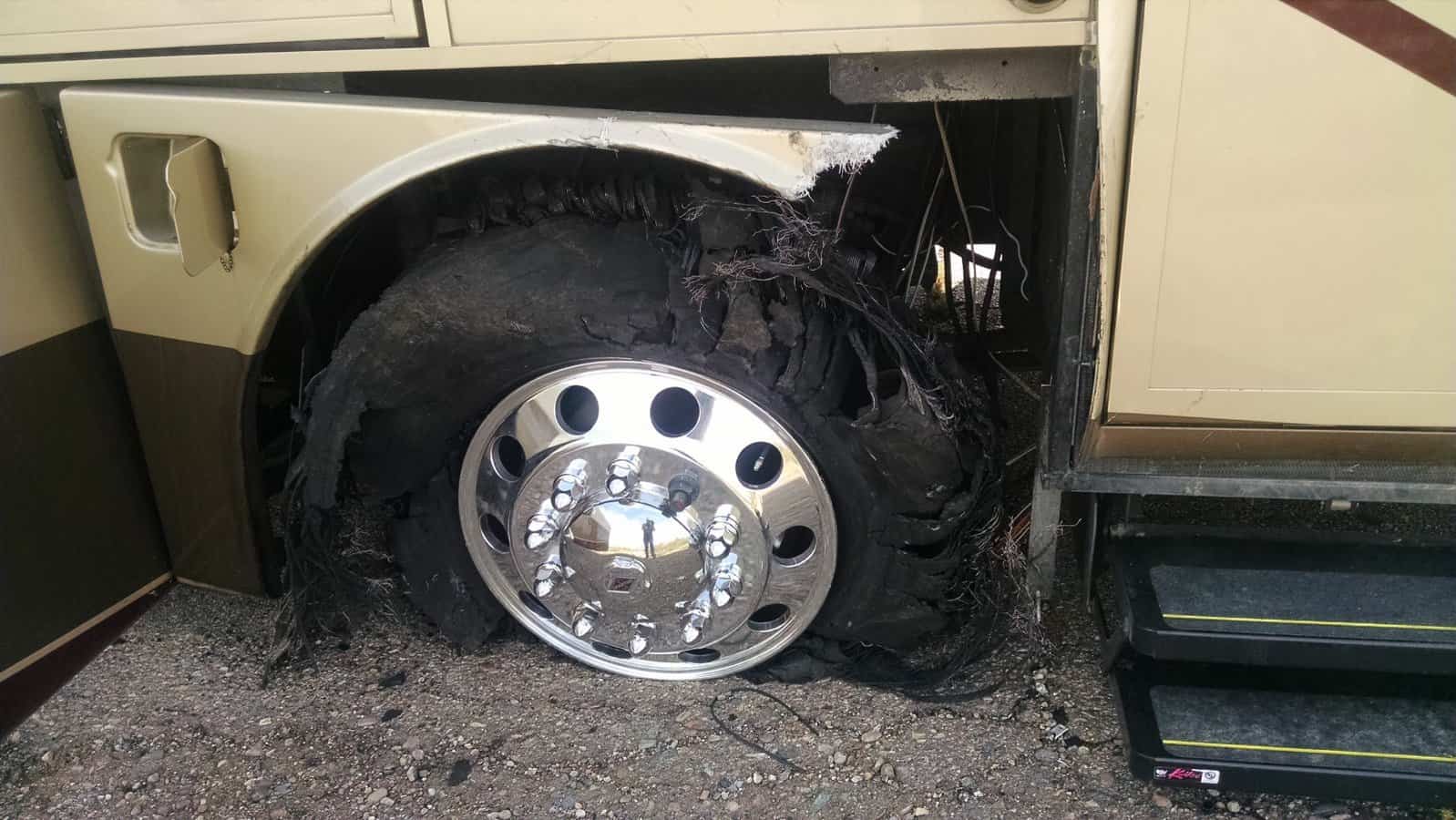
Tires– check the data on the side of the actual tire and make sure the pressure is as indicated. Do not go by labels on the trailer as different tires (like when you replace tires) may need different pressure and may not match the metal labels. Also check for uneven wear as it will indicated improper tire pressure, alignment problems (motor homes), a bent axle or overloaded RV. Also read the info on the tire as it should give the maximum driving speed. Blown tires are a common issue and a lot is due to poor inflation and/or driving too fast.
Wheels – Check wheel lug nuts at specified intervals to listed torque specifications (per manual). Re-torque as needed.
Safety Chains – check that your safety chains are not rusty, cracked or broken.
Wiring connector – check that the electrical wiring connector is not dried or cracking and is clean. Dirt in the connector can cause failure. Be sure to use a cap on both connectors when not hooked up.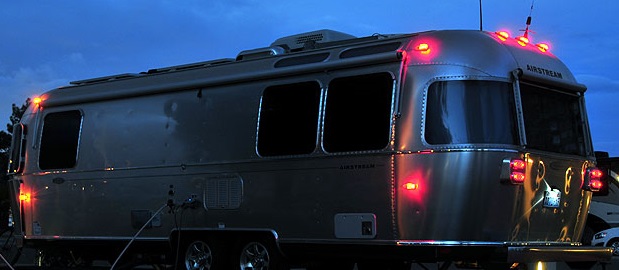
Brake/running lights – have somebody help you test your brake lights, turn signals and running lights. I do this EVERY TIME before pulling out.
Trailer Frame – Rocks, sand, road debris, climate (like salt air exposure) and especially the ice inhibiting chemicals used during the winter months can damage your frame’s painted exterior, inviting rust and other deterioration. Regularly inspect all exposed areas of the frame. To maintain protection, clean and repaint any chipped areas or rust spots. Also check for loose wiring or water hoses.
Exterior Roof – inspect all roof sealant every three (3) months for voids, gaps, and cracks then re-seal as needed. This is typically required to maintain your warranty. It is a good practice as a small crack can result in water leaks that might not show up until considerable interior damage has occurred.
Tow vehicle maintenance.
Make sure you maintain recommended/required maintenance on your tow vehicle. It’s a good idea to do this more often if you are traveling a lot with your RV as this is added wear-and-tear on your vehicle – no matter how powerful your vehicle is. Also check your hitch and it’s wiring connections regularly. Check that the hitch is still secured well, not rusting and clean of dirt – especially sand. Use a dust cap in the receiver when not connected.
Camping Equipment.
Meds – Don’t forget your required medications and take extra in case you have to extend your trip.
Safety alarms – make sure all smoke and carbon monoxide sensors are operating properly.
Propane – NEVER travel with your propane tanks turned on. Many people do this but, if you should have an accident, it can result in a ruptured propane line which will likely mean a BIG fire and possibly an BIG explosion. It is even illegal in some states. At a minimum, you cannot legally drive over/through many tunnels and bridges (such as the tunnels around Baltimore, MD). People get by with it every day and few experience the dangers but the danger is just simply not worth the risk.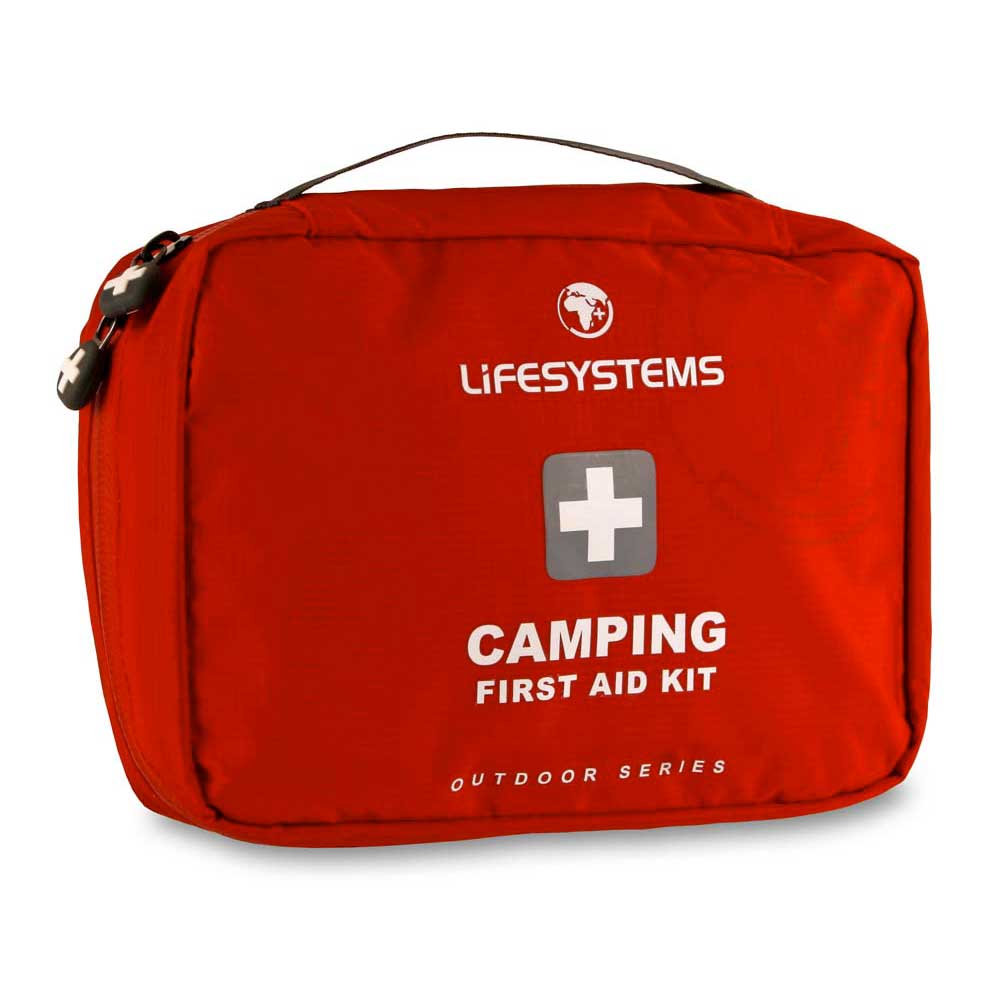
First Aid – Have a good camping first aid kit easily available. Don’t cheap out for a small or inferior kit. Also make sure your kit is immediately re-supplied when used.
Camping Habits.
Fires – NEVER – never ever leave a campfire unaccompanied. This is just a great rule and is even listed in the rules of most campgrounds. Too many brush/forest fires result from “I just stepped away for a moment”. Don’t be the one responsible for a fire running out of control.
Be sure to completely extinguish the fire with water or sand whenever you’re turning in or leaving camp.
When starting your fire, clear the area of all debris – even if there is a fire ring/pit. Make sure there aren’t any overhanging branches. Don’t use any flammable liquids to light a fire and build it only as big as you need.
Weather – STAY UP-TO-DATE WITH THE WEATHER
Tornados often wreak havoc on campgrounds and too often result in deaths. Your campsite may provide a tornado shelter – know where it is. If not ask where the nearest shelter is. If such a shelter is available get to it as quickly as possible when needed!
If a cave is nearby seek shelter there. If no shelter is available seek out a ditch or ground depression where you can lay face down and cover your head.
Make sure to keep an eye on the weather forecast before your trip. As we all know, weather can change within the hour, which means it’s essential to pack for inclement weather such as rain, snow, and high heat and humidity.
About 33% of campers plan trips one month in advance to be proactive.
Hydration – STAY HYDRATED Staying hydrated doesn’t mean drinking when you’re thirsty — it means drinking water regularly throughout the day, even if you don’t think you’re thirsty. If you do not have water at the site, your emergency kit should include at least a 3-5 day supply of bottled water. If you feel thirsty, chances are you’re already dehydrated.
Woodland Friends
You are heading into the home of many a fine furry (wild) friend. You should understand how to get along with residents of the woods.
Depending on where you camp, you might just have geese or birds as visitors to your site but a wolf, raccoon or even a bear might lumber through at times.
The main idea to follow is never leave food out. NEVER! It’s like ringing the dinner bell. If the kids are in a tent next to the RV, make sure none of them are sneaking snacks into the tent. Even a few crumbs can entice a raccoon or skunk inside and their claws make short work of the tent fabric.
Even take care inside your RV. The best prevention to keep out mice, chipmunks or even bigger critters is cleanliness. A bunch of crumbs left on the sink counter can result in an ant invasion easily. Use plastic containers to store your opened/loose food items or place them in the fridge.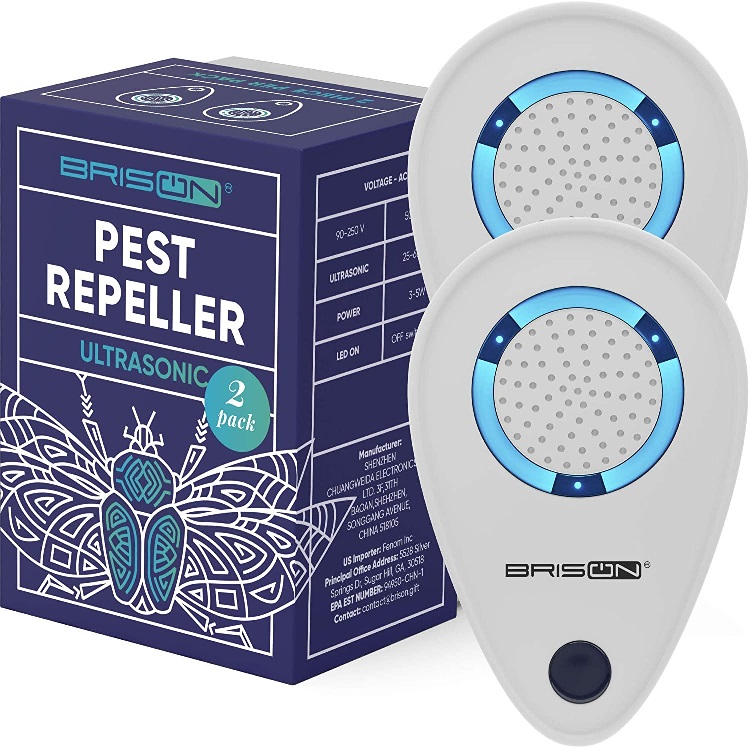 We use 2 sonic pest repellers in our trailer and we have NEVER had any problems with critters or bugs. One is used inside while I place the second one outside when we are camping. While a sonic device may not keep them from ever entering, it makes sure they do not stay around.
We use 2 sonic pest repellers in our trailer and we have NEVER had any problems with critters or bugs. One is used inside while I place the second one outside when we are camping. While a sonic device may not keep them from ever entering, it makes sure they do not stay around. Skunks – Scavengers. They are basically harmless as long as you do not scare them. This means your pets too! While camping in Cades Cove in the Smoky Mts, the campsites were frequented by many skunks but they were fine since no one pissed them off. Again, leaving food out, or in a tent, is an absolute invitation to skunks and this can lead to unpleasant encounters. If you, or your pet, gets sprayed, I can personally vouch that a diluted mixture of tomato juice works extremely well. Our dog managed to encounter a skunk and left with eau-de Pepe Le Pew. I washed her head down with 50/50 tomato juice and water and the smell was gone.
Skunks – Scavengers. They are basically harmless as long as you do not scare them. This means your pets too! While camping in Cades Cove in the Smoky Mts, the campsites were frequented by many skunks but they were fine since no one pissed them off. Again, leaving food out, or in a tent, is an absolute invitation to skunks and this can lead to unpleasant encounters. If you, or your pet, gets sprayed, I can personally vouch that a diluted mixture of tomato juice works extremely well. Our dog managed to encounter a skunk and left with eau-de Pepe Le Pew. I washed her head down with 50/50 tomato juice and water and the smell was gone.
Bears – Many places have bears wandering through the campgrounds. I have been tent camping and heard bears trying to get into the bear-proof trash cans less than 10 feet away. My food was locked up in the car so they did not come any closer. DO NOT try to get close with (or play with) bear cubs.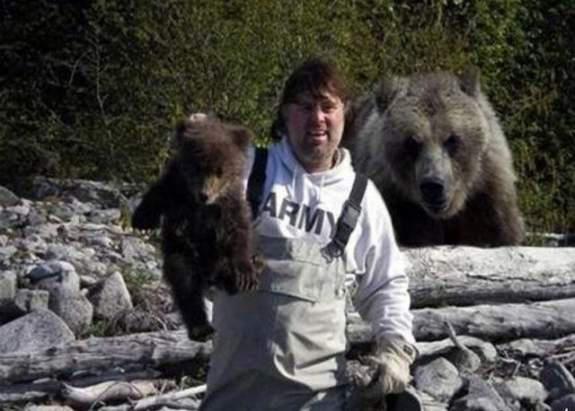
Mama bear is not far away and she will rip you apart to protect her cubs so make sure you are not between mom and her cubs. Raccoons – mischievous little devils, with nasty teeth. They will get into anything your leave accessible. They also are carriers of rabies so leave them alone.
Raccoons – mischievous little devils, with nasty teeth. They will get into anything your leave accessible. They also are carriers of rabies so leave them alone.  Opossums – another big time scavenger. Even though them MIGHT ‘play possum’, a mother will protect her babies with a vengeance and she has a big set of nasty dirty sharp teeth to use for that. They are nasty critters and typically reek of the smell of rotted flesh and filth. Just give them space.
Opossums – another big time scavenger. Even though them MIGHT ‘play possum’, a mother will protect her babies with a vengeance and she has a big set of nasty dirty sharp teeth to use for that. They are nasty critters and typically reek of the smell of rotted flesh and filth. Just give them space. Ground squirrels (chipmunks) – ‘little rats with furry tails’. They are fun to watch but they will squeeze through the smallest openings to get into your RV – and they are good at it. I have had them get into my tent and take off with wash cloths, clothing, and anything that might make for a better nest.
Ground squirrels (chipmunks) – ‘little rats with furry tails’. They are fun to watch but they will squeeze through the smallest openings to get into your RV – and they are good at it. I have had them get into my tent and take off with wash cloths, clothing, and anything that might make for a better nest.
These are the animals you are most likely to encounter that you need to understand in order to avoid less-than-pleasant encounters with. You will hear and see birds that you likely have never encountered, maybe deer or elk, possibly a fox or wolf but they will pretty well always stay clear of you. Not to say that if you insist on trying to chase them down or get too close that they can’t put some real hurt on you.
I saw a recent movie clip of a touron (tourist moron) in Yellowstone that went up to pet a bison and ended up doing fantastic feats in the air.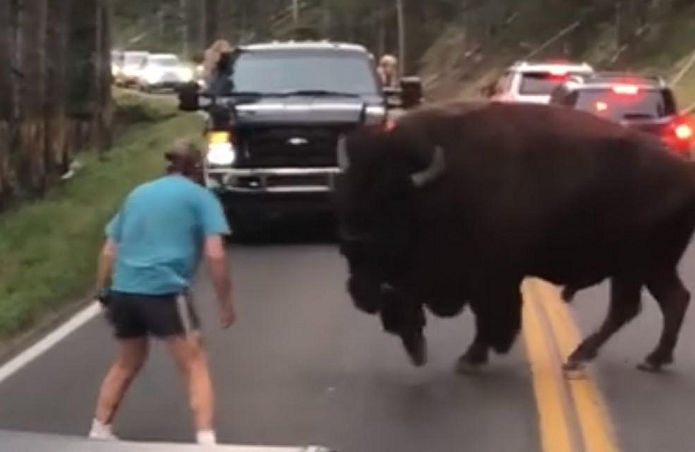
Don’t be that touron. We are visiting their home and nature is already pressed to it’s limits.
Don’t wreck it. Don’t litter : take out everything you take in.
Don’t go marring trees or pulling up plants.
Leave no signs that you were there
Camp Site
Examine the site before setting everything up. Regardless of the type of camping, look up into any trees and check for dead/rotten limbs that could easily fall. Request that the campground remove them or assign you to another site if you see any that look dangerous.
Keep any camp fires away from your RV/tent – especially tents. Sparks, even small ones, can quickly melt a hole through newer, lighter, tents and even set them on fire.
Look at the general landscaping of the site. If it is the lowest spot in the general area, you will be floating away in a good rain.
Check for poison ivy/oak. You don’t have to be allergic to end up all itchy.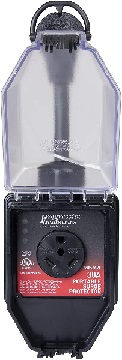
Electric hookups. If the electric hookup is exposed, all rusty, or not mounted on a post don’t use it. Make sure you also use a surge/circuit sensor/protector.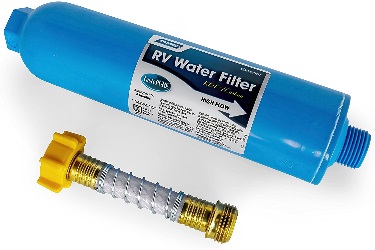
Water : You never know how pure the water is when camping. Even pure water may have different elements than what you are used to that can cause unpleasant results so always use a water filter when connecting to water or a drip filter (such as Brita).
Debris: check the ground and clear out any sizeable branches and look for exposed roots or other tripping hazards. If you can, place a table or chair over them. At least place something obvious there to mark them.
